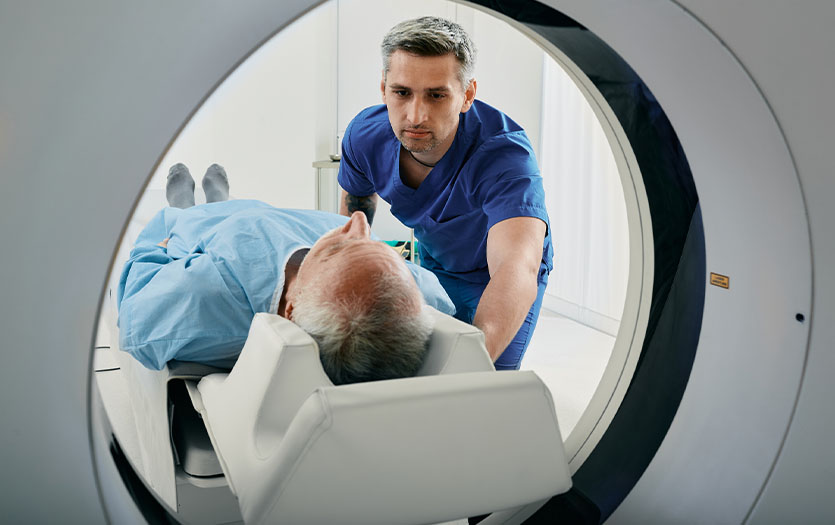
If you or a loved one has tested positive for COVID-19, you may be wondering what else you can do to reduce your risk of hospitalization or complications from the virus. Fortunately, there is a therapy that could give you a leg up. For more on the subject, we look to Mindy Kurtz, MBA, BSN, RN-BC, director of nursing services, Emergency Department, Parkview Health, as she discusses what monoclonal antibody infusions are, how they benefit patients and where to turn for treatment.
What is a monoclonal antibody infusion?
Antibodies are proteins that your body makes naturally after being exposed to an infection. This creation can take days or weeks after exposure to an illness. Fortunately, scientists can now create these monoclonal antibodies for some diseases in a laboratory. These man-made antibodies act as a substitute for naturally occurring ones, helping to restore, enhance and mimic the immune system’s attack on cells.
How does the therapy work?
Patients receive monoclonal antibodies through an intravenous infusion. They help block the virus that causes COVID-19 from attaching to human cells, making it more difficult for the virus to reproduce and harm healthy cells. There are currently two different monoclonal antibody combination drugs under Emergency Use Authorization (EUA) by the FDA for COVID-19 treatment.
What are the benefits of an antibody infusion?
Antibody infusions have shown some benefit in decreasing the length and severity of COVID-19 illness in individuals who are not currently experiencing severe disease symptoms but are at an increased risk of hospitalization or complication from COVID-19.
Who would benefit from this type of therapy or treatment?
Currently, the Food and Drug Administration (FDA) has released the monoclonal antibody infusions for patients with mild to moderate symptoms of COVID-19, a positive COVID-19 test and who are at high risk for progression to severe COVID-19 illness. Patients must meet specific criteria to qualify for the treatment.
A high-risk patient is someone who meets or has at least one of the following criteria:
- A body mass index (BMI) greater than or equal to 35
- Chronic kidney disease
- Diabetes
- An immunosuppressive disease
- Currently receiving immunosuppressive treatment
- 65 years of age or older
- 55 years of age or older and have cardiovascular disease, hypertension, chronic obstructive pulmonary disease (COPD) or other chronic respiratory diseases
Additionally, there are some indications for older children, starting at age 12, who have chronic medical conditions. It’s best to check with your primary care physician to see if your child would qualify for this specific treatment.
Where can someone receive a monoclonal antibody infusion?
Currently, patients can receive infusions at any Parkview Health Emergency Department (ED). The procedure lasts anywhere from 20-60 minutes, with patients monitored for one hour post-infusion to ensure they don’t have any side effects. If you’re interested in the treatment, please check with your primary care provider to direct you to the closest, most appropriate location. A copy of a positive COVID-19 test may be required.
What can someone expect before, during and after an infusion?
Upon arrival, clinic staff will ask patients about their symptoms, the duration of the symptoms, current medications, take a medical history and vital signs and obtain a current weight. Staff will also provide written information about the monoclonal antibody infusion if patients want to discuss the procedure with the ED provider.
If a patient qualifies for the treatment, the staff will prepare the medication for administration. The therapy requires an intravenous catheter placed in the patient’s arm or hand that will remain for the duration of the infusion. Staff will monitor patients during the procedure for any signs of an allergic reaction. Once infused, the nursing staff will continue to monitor patients for an additional hour before discharging. Patients should plan on being in the ED for about three hours total.
The side effects of receiving IV medicine may include temporary pain, bleeding, bruising of the skin, soreness, swelling and possible infection at the infusion site. Be sure to communicate any nausea, headache, itching, hives, shortness of breath, chest discomfort, rapid heart rate, dizziness, sweating or other symptoms you may be experiencing at any time during or after the infusion.
Is this treatment appropriate for everyone?
The monoclonal antibody infusion is not appropriate for everyone that has a positive COVID-19 test. It is currently not authorized for use in anyone hospitalized, requires oxygen therapy due to COVID-19 or has had to increase their home oxygen usage flow rate because of COVID-19. It’s also not authorized for anyone who does not meet the high-risk criteria. Please reach out to your health care provider to see if the infusion is correct for you. You can also visit the Centers for Disease Control and Prevention (CDC) website for the most up-to-date information about the infusion treatment and those who may qualify.
Final thoughts
If you have recently received a COVID-19 vaccine or are planning on getting the vaccine soon, it’s important to let your healthcare team know before the infusion. They will have recommendations for a timeframe to proceed with your vaccination. It is also imperative that, if you qualify, you receive the treatment within 10 days of symptom onset. The earlier, the better.



